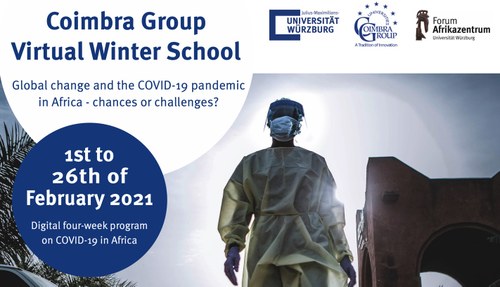1 - 26 February 2021. Deadline: 20 January 2021

The Winter school, organised by the University of Würzburg and the Coimbra Group, offers you:
Application and further information about the programme are available here.
Who can participate
Students enrolled at a 2nd Cycle Degree Programme or a Phd Programme of the University of Bologna.
The Winter School will host until 50 MA and PhD students from Coimbra Group Universities and African universities. They will learn about impacts, challenges and responses related to Covid-19 and Africa thanks to a range of experts teaching and researching at Coimbra Group (CG) and African partner universities. The participation is free of charge.
Concept
Since the global exchange of people is ultimately responsible for the intercontinental spread of the Covid19, the corona pandemic can be described as a disease of globalization. If you look at Africa in the midst of this crisis as the continent that benefits the least from globalization and is still an essential part of a global economic system due to its natural resources, there are a few special features.
Before the crisis, Africa was the breeding ground for many pandemic diseases such as HIV or Ebola, but with Covid-19, which came to the continent from European diplomats, business travelers and tourists, the direction of the infection chain is changing. Covid-19 is primarily a disease of mobility.
But precisely because of the experience with Ebola and other tropical infectious diseases, many African countries seem to be well prepared for the pandemic despite poorly equipped health systems. A Corona test was developed in Senegal while the rules of social distancing were activated in Liberia, Sierra Leone and Guinea, the most affected countries in the world Ebola epidemic 2014-2016.
If one believes the epidemiological prognosis of some observers, the corona pandemic will not hit the African continent as much as Italy, the US or Brazil in terms of mortality rate. Even if the official infection numbers are (still) relatively low in comparison to the rest of the world, which may also be due to a lack of test capacities, major socio-economic challenges are already beginning to appear: the weak economic systems are on the verge of collapse in many places. Due to the curfews, day laborers and business people in the informal sector cannot earn money for their daily livelihood. The payment of 'western' development aid is also expected to decrease in the next few years.